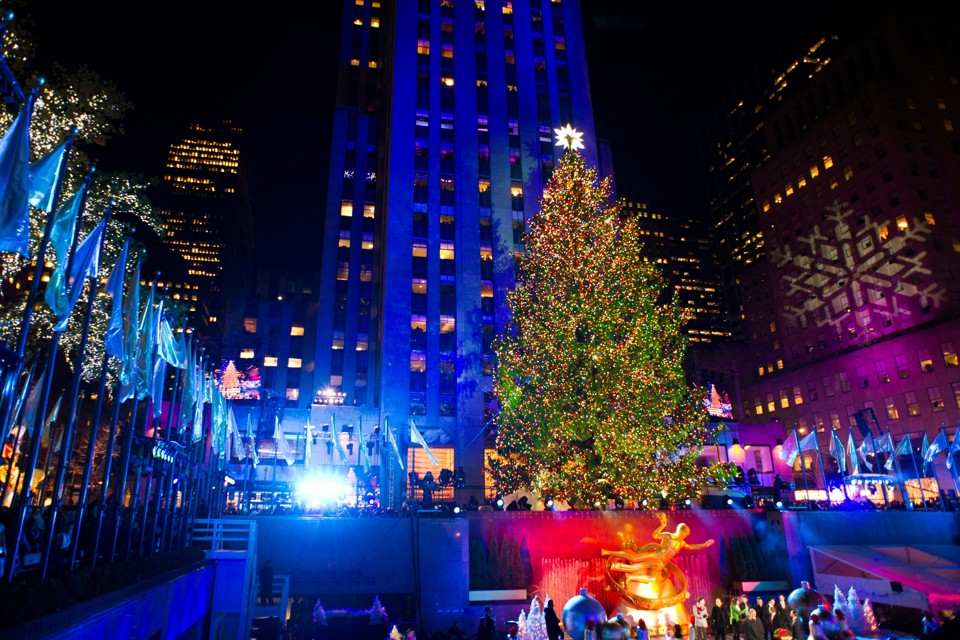Christmas's War on America
The persistence and power of the December holiday over generations of Americans—whether they liked it or not.

Every year, a new round of politicians attempt to breathe new life into America’s thoroughly exhausted war on Christmas. But this year, maybe it’s time instead to examine Christmas’s war on Americans.
For centuries, the holiday has served as a flashpoint between competing religious ideas. When the Puritans of New England famously made Christmas illegal during their first decades on this side of the Atlantic, it was not because they were killjoys—or at least, not only because they were killjoys. Christmas was an existential threat to orderly society, a shorthand for the spiritual risks they encountered every day in the New World. The era’s leading preacher, Cotton Mather, even continued to rail against the “heathen feast” after the laws prohibiting Christmas were repealed.
“Can you in your Conscience think, that our Holy Savior is honoured,” he wrote, “by Mad Mirth, by long Eating, by hard Drinking, by lewd Gaming, by rude Revelling; by a Mass fit for none but a Saturn, or a Bacchus, or the Night of a Mahometan Ramadam?”
Mather’s invocation of a bevy of supposedly infidel enjoyments was not incidental: “There are Plantations within this Province, which ly in horrid Paganism and Atheism,” Mather wrote. This tension between doctrinal discouragement of the holiday and its stubborn persistence underscored just how shaky the hold of Calvinist theocracy was on these precarious outposts chinked from the wilderness.
Meanwhile, inside their own households, the Puritans tried hard to convert their slaves, who had been torn from their homelands but who rarely left their beliefs behind. Mather himself had an African-born servant living in close quarters with his family, but try as he might, Mather was never able to convert him.
Perhaps if Mather had embraced the joys of a heathen Christmas, he would have been more successful. For, as the Puritan influence waned, the holiday gained ground. Had Mather lived longer, he would have found that the most powerful tool in the transformation of the beliefs of the enslaved may have been Christmas itself.
Efforts increased to Christianize the non-Christian population upon whose labor the season’s leisure depended. During a period of enforced joviality—described without irony in 1860 as “that great time of freedom from restraint among our slaves”—the very holiday vices Mather bemoaned became mandatory.
“The slaveholders not only like to see the slave drink of his own accord,” the former slave and abolitionist Frederick Douglass recalled, “but will adopt various plans to make him drunk.”
For those slaves who didn’t take to conversion, Christmas proved essential to the suppression of their own long-held beliefs, including Islam, Yoruba, and a variety of other African traditions. Before the Civil War, slave owners safeguarded their sense of control by imposing Christian traditions on slaves. Unsurprisingly, this did not always have the intended religious effects. During visits to plantations in the 1830s that led him to write The Religious Instruction of Negroes in the United States, the missionary Charles Colock Jones noticed that those who were aware of the Gospel story often came to their own conclusions about its significance. Many of the enslaved, Jones noted, “have been known to accommodate Christianity to Mohammedanism. God, say they, is Allah, and Jesus Christ is Mohammed—the religion is the same, but different countries have different names.” Still, the insinuation of Christmas was moving forward apace.
Evidence of a different sort of accommodation can be found in newspaper reports written well into the following century. An account of a gathering of former slaves in Atlanta in 1932 describes how these elderly men and women came together at Christmas, “the only big day in their lives,” not to sing hymns or carols but to share “the old songs of their childhood.” Though they sang about Jesus, the article continued, the “pagan” music accompanying the lyrics seemed to echo from a half-forgotten pre-Christian past. “These melodies are their only heritage,” the report noted. As with the Puritans, Christmas had triumphed, while the influence of other traditions receded into the background.
“The holidays are part and parcel of the gross fraud, wrong, and inhumanity of slavery,” Douglass wrote. Christmas was used as a weapon against the bodies and the beliefs of those powerless to resist.
Even those with the power to resist often cannot. Every group of non-Christian immigrants is faced with the pressure to adopt or adapt to December rituals as markers of American identity. In the late nineteenth century, rabbis serving Eastern European Jewish immigrants awed by the seasonal opulence of their new country echoed Cotton Mather in their arguments against Christmas as “heathen” and excessive. Like the Puritans, they did so in part because they knew how attractive heathen excess could be.
From its earliest introduction in America, Christmas has been a volatile holiday as new ideas have come in contact with old. In fact, Christmas might best be seen not only as a day holy to some but as an indicator of the remarkable theological flexibility and persistence required to turn the commemoration of an ancient story into a garish season of neon lights and spending excesses—the social and economic high point of the year. In other words, if there is a war on Christmas, then Christmas is winning it.

No comments:
Post a Comment